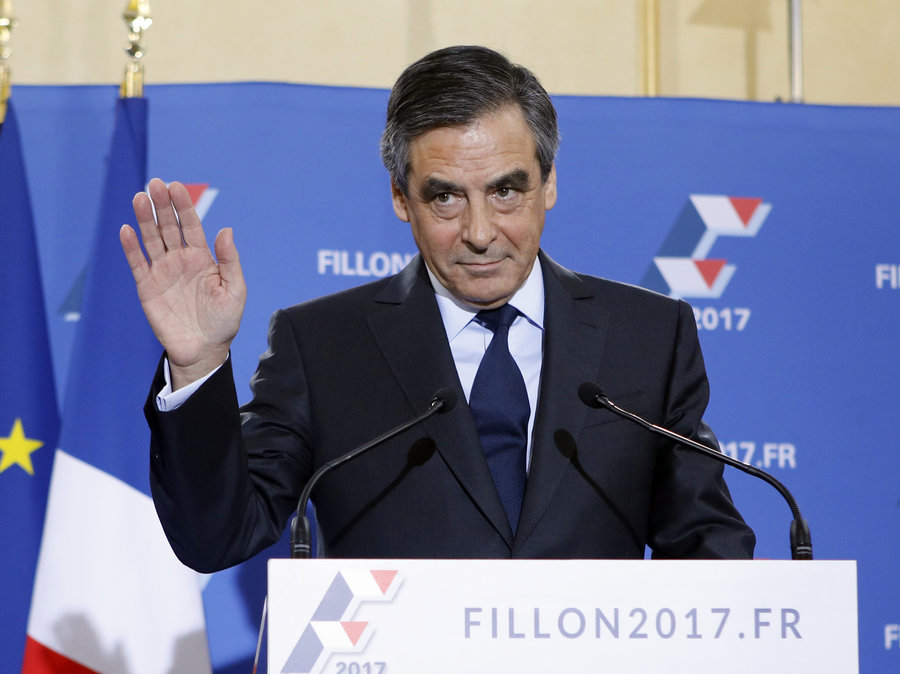Paris- After he overtook his rival Alain Juppe in the second round of the right wing primaries, the former French Prime Minister, Francois Fillon, has become the candidate of the Republicans Party and its allies for the French presidential elections set to take place next spring.
Considering the deep division dominating both the French left wing and the Communist party, Fillon has been the luckiest to become the eighth French president. Surveys suggest the Communist Party, whether it will be represented by Francois Hollande or his Prime Minister Emanuel Valls, will never succeed in passing the first electoral round and that the competition will continue between Fillon and the candidate of the Far-Right wing Marine Le Pen.
However, noting that the French public hasn’t yet accepted the Far-right in presidency, the road to the Élysée Palace will be paved for Fillon, say observers. According to the latest survey, the winner of the right wing candidate with 66.5% of votes will be able to squash Marine le Pen and to receive 65% of the French voters’ voices.
The major focus now is on the expected changes in the social, economic, and security policies and about France’s foreign policy concerning the hot focuses in the Middle East and the Arab World.
Fillon’s program and the public debates that took place before the primaries showed that he intends to make changes in France’s foreign policies regarding its war against terrorism and the way it tackles internal security. However, diplomatic sources told Asharq Al-Awsat that Paris will keep some of its current traits in its foreign policy to maintain its international commitments and protect its strategic, economic, and cultural interests.
According to the French constitution, the president, who leads the armed forces and controls nuclear power, has been the first person in charge with drawing the country’s foreign and defense policy.
When asked about his opinion concerning the “war and crimes against humanity” committed in Aleppo, Fillon evaded the answer, which was not surprising because his position from the war in Syria was different from the official French position taken since the launch of the war during the rule of Sarkozy and Alain Juppe. According to Fillon, his country’s stance from this war should be realistic and that its priority in the Middle East should focus on combating ISIS.
After the massacre of Nice which left 80 people dead and hundreds injured in July, Fillon released a book on what he called Islamic Totalitarianism; commenting on his book during an interview, the Republican candidate, who warned from a Third World War, said that the west has faced a violent movement that aims at controlling a part of the world by using ideology and totalitarian measures along with massacres against Christians and Jews.
Fillon considers that France should be open on the Syrian regime and to cooperate with it to combat ISIS and terrorism. He believes that two camps have fought in Syria and the moderate opposition does not really exist.
Fillon even proposed to launch a channel of communication with the Syrian regime and accused the French government of practicing a wrong policy by supporting the opposition and calling on Assad to leave. During an electoral debate Fillon said that Assad’s persistence in his position emphasizes his popularity and that the fall of his regime will threaten Christians of the Middle East.
Some French MPs close to Fillon have visited Bashar Al-Assad twice, which provoked the French government and mostly the Ministry of Foreign Affairs.
Based on what he called “political reality”, the right-winged candidate has called for more cooperation with Russia, the major supporter of the Syrian regime. Despite his support for the sanctions against Moscow after annexing Crimea, Fillon has called on the Europeans and Westerns to enhance ties with it.
Apparently, the former prime minister has also sought to redirect his country’s policy concerning the Gulf region through rapprochement with Iran and reconsidering relations with the Arab Gulf, which will represent a drastic change in French policy -adopted since the seventies – and threaten its interests in the region.
As per the national policies, Fillon seeks to prevent terrorists who have joined extremist organizations from returning to France and to strip their nationality. He also plans to kick out foreigners proved to have cooperated with extremist groups.
